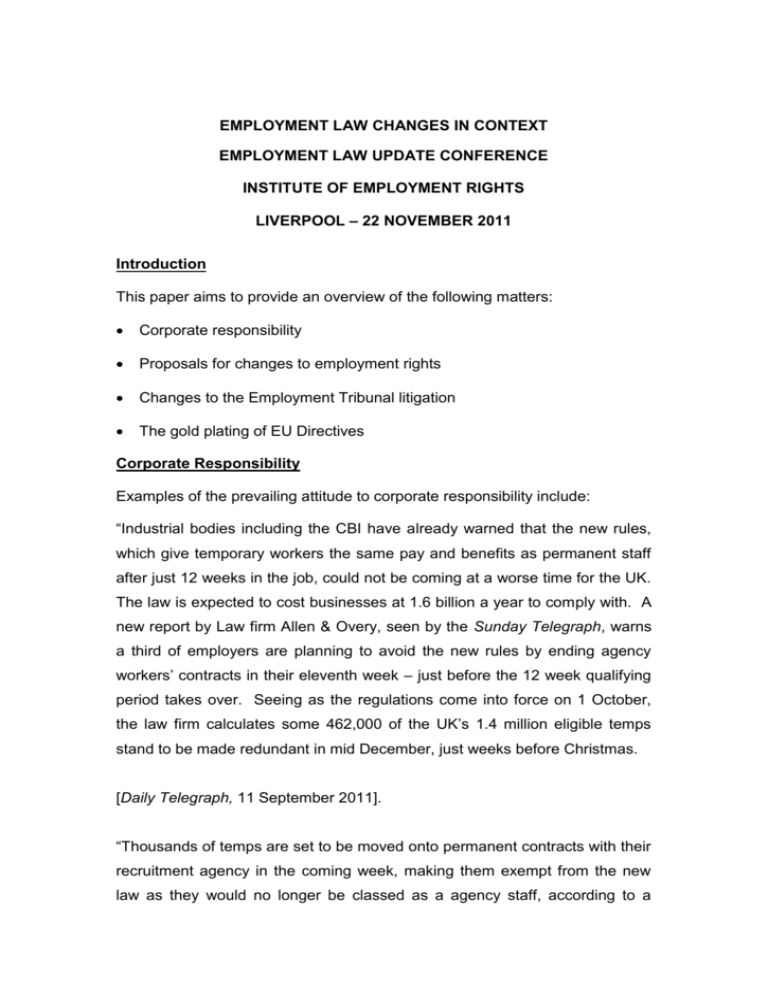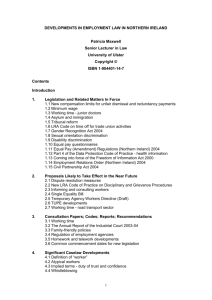Binder Bansell Employment Law Changes in Context Paper.doc
advertisement

EMPLOYMENT LAW CHANGES IN CONTEXT EMPLOYMENT LAW UPDATE CONFERENCE INSTITUTE OF EMPLOYMENT RIGHTS LIVERPOOL – 22 NOVEMBER 2011 Introduction This paper aims to provide an overview of the following matters: Corporate responsibility Proposals for changes to employment rights Changes to the Employment Tribunal litigation The gold plating of EU Directives Corporate Responsibility Examples of the prevailing attitude to corporate responsibility include: “Industrial bodies including the CBI have already warned that the new rules, which give temporary workers the same pay and benefits as permanent staff after just 12 weeks in the job, could not be coming at a worse time for the UK. The law is expected to cost businesses at 1.6 billion a year to comply with. A new report by Law firm Allen & Overy, seen by the Sunday Telegraph, warns a third of employers are planning to avoid the new rules by ending agency workers’ contracts in their eleventh week – just before the 12 week qualifying period takes over. Seeing as the regulations come into force on 1 October, the law firm calculates some 462,000 of the UK’s 1.4 million eligible temps stand to be made redundant in mid December, just weeks before Christmas. [Daily Telegraph, 11 September 2011]. “Thousands of temps are set to be moved onto permanent contracts with their recruitment agency in the coming week, making them exempt from the new law as they would no longer be classed as a agency staff, according to a number of recruiters. Under the rules, coming into effect on October 1, temps will be entitled to the same pay and benefits as permanent employees after just 12 weeks in a job. The law is expected to cost businesses some 1.8 billion a year. The Regulations state that any recruiter employing the temp as a permanent worker can legitimately avoid the rules and continue paying a reduced wage. A number of recruitment agencies are planning to adopt the so-called “Swedish derogation” model – casting doubt over the usefulness of the new rules. Staffline, a Nottingham – based recruiter which supplies DHL workers at the Jaguar Land Rover Plant in Halewood, is preparing to move 100’s of temps onto permanent contracts”. [Daily Telegraph, 27 September 2011] It is apparent from the media coverage, and bearing in mind that Agency Worker Regulations are now in force that a number of employers view the Regulations as unwelcome and costly. This is notwithstanding the fact that the Regulations, derived from an EU Directive, recognise the need to protect the abuse of agency workers in terms of their working conditions and/or benefits. Unions will need to guard against practices, which are outlawed by the Regulations and the extended use of any Swedish derogation models. The UN Committee on the Elimination of Racial Discrimination (CERD) has concluded that the UK needs to do more to address racial inequality. Having heard evidence from a coalition of 130 UK organisations and interrogated Government representatives, CERD indicates that UK needs to “adopt a detailed action plan…for tackling race inequality”. This should involve targets and monitoring procedures in consultation with minority and ethnic groups. Further efforts to narrow the employment gap for ethnic minorities should be stepped up and the Government should prepare a detailed delivery plan setting out how it intends to do this in all areas and all levels of employment. Particular examples where there remains a persistent gap between the low representation of ethnic minorities such as police forces and the criminal justice system needs to be addressed. This may also involve wider measures to be adopted to ensure that employment in these sectors reflects wider society. How can the views of business in relation to matters such as the Agency Worker Regulations and the observations of a UN Committee on the inadequacies of the discrimination protection in this country be reconciled with the notion of corporate and Government responsibility? Proposals for changes to Employment Rights A number of proposals can be seen as weakening trade union rights. These include: A reduction in the statutory collective consultation for redundancy exercises to 30 days in all cases. The statutory recognition procedure – mandatory ballots (in all cases). Industrial action ballots – a minimum threshold of at least 40% of the membership of the union voting in favour of industrial action. In the case of industrial action ballots, such an argument overlooks a number of fundamental rights and obligations, including: A member will have exercised his/her democratic right to abstain from a vote for industrial action. It is at all times open to a union member/non-member not to heed the union’s call to induce them to take industrial action. Minimum thresholds in ballots are not uniformly applied. example being elections for candidates to Parliament! The obvious The Institute of Directors has also put forward a number of proposals, which the IOD feels would assist its members, but are clearly designed to weaken employment rights and to shift the balance in favour of the employer. These include matters such as: No right to flexible working. Abolishing the right to time off for training. A minimum deposit of £500 for pursuit of an Employment Tribunal claim. It is perhaps not surprising against this background that trade unions are currently fighting a number of cases to determine the extent of their rights against the background of both Convention rights and ILO conventions. These challenges include: RMT v. United Kingdom, the union is complaining that its capacity to organise industrial action to protect the interests of its members is unduly restricted by UK law. This deals with a challenge to the complex statutory requirements on a union’s notification of industrial action. An application by Unite called Roffey v. The United Kingdom, arguing that the UK legislation provides no protection against action short of dismissal for participating in the strike. The case arises from the BA dispute in which BA penalised cabin crew who took part in industrial action by removing their travel benefit. Prison Officers Association v. United Kingdom is an application to the ECHR that would challenge the prohibition to strike in the case of Prison Officers. The ILO committee of experts criticised the Government for failing to have an adequate mechanism to compensate prison officers for depriving them of their right to withdraw their labour. Changers to Employment Tribunal Litigation The Government has issued a consultation paper, “Resolving Workplace Disputes” The consultation opened in January 2011. This has already been the subject of a number of critiques from stakeholders. The EHRC in their response makes the following points. “in response to the Government’s proposal to increase the qualifying period for unfair dismissal protection, the Commission notes that no evidence has been adduced to show that this will have the intended effect of increasing recruitment levels. Indeed it may have the unintended consequence of giving rise to more discrimination claims. We present detailed data analysis that shows some differences in length of service for different groups. We note that there is a long-term trend of men on average having longer service than women, although the statistics have been converging slowly. We also note that if the statistical evidence shows a small but persistent disparity between the comparator groups that may meet the disadvantage test for indirect discrimination. We say that if this proposal is adopted, we would expect the Government to monitor the effects. The Commission supports the proposal to introduce a system of financial penalties for employers found to be in breach of their obligations, as this would help improve compliance and be consistent with the Government’s obligation to provide remedies that are effective, proportionate and dissuasive. We are also keen to see if effective use being made by Tribunals of their new power to make recommendations affecting an employers organisation as a whole”. It ought to be borne in mind that background to the consultation paper would tend to suggest that Employment Tribunal claims have spiralled out of all proportion and/or are being pursued by Claimants without any due consideration for the prospects of success. The Tribunal Service’s own statistics suggest that this is not the case. The headline figure is a total of 218,100 claims lodged during 2010/2011. This represents an 8% fall compared to 2009/2010. The Government has also suggested that one of the ways in which it will deal with the apparent upsurge in claims is to increase the qualifying period for unfair dismissal to two years. The EHRC has already noted some of the disparate impacts that this measure might have. It should also be borne in mind that of the 382,400 jurisdictions cited in 2010/2011, only 47,900 claims related to a pure unfair dismissal claim. According to my calculation, an increase in the qualifying period to two years would only directly affect less than 13% of the claims presented to the Employment Tribunal last year. Further other claims which do not have a qualifying period would still be permitted. I question how such a measure could be proportionate and effective. The reasons for litigation, especially in the current recession, are apparent. There are also a number of other factors to consider, including: The increasing “individualisation” of trade unions and industrial relations generally. Without union representation, Tribunal claims are the only methods of enforcing rights. The increase of the Internet and greater awareness of employment rights. The growth in the number of new rights and the enforcement of such rights. The continued large number of multiple cases. This might be in relation to equal pay and/or working time litigation. The changes and the nature of the working relationship – less paternalistic employers, more globalisation and the death of the “job for life”. The possibility that society generally is increasingly litigious. It is apparent that the continued high number of claims is not due to vexatious claims but for a complicated mixture of reasons set out above. Gold Plating of EU Directives The Government Coalition Agreement published on 20 May 2010 sets out two deregulatory employment law policies. First, a “one in, one out” approach to employment regulations. This would mean that a new regulation cannot be brought in without an equivalent or greater degree of other regulation being cut. It is apparent that such a policy has not been given adequate thought and care. Many employment laws cannot simply be cut away to make way for a new law. This is the case where there might be the implementation of a EU Directive. By way of example, if the Government wanted to scrap the Agency Worker Regulations, it will still need to ensure that the minimum requirement of the EU Temporary Workers Directive was implemented by the deadline of 22 October 2011. The failure to do so, would result in the Government being subject of an EC led infringement proceedings in the ECJ and/or “Francovich” claims in the domestic courts. The second proposal is an end to the “gold plating” of the EU Directives. This is the practice where it is asserted that there is an improvement on the minimum level of protection required by European Directives when transposing them into national law. Member States have a certain amount of discretion as to the best way to achieve the effect required by an EU Directive. However, they are limited by certain general principles; Effectiveness – Member States are entitled to impose conditions and limitations on the exercise of rights derived from EU law – for example, time limits on bringing a claim. However, these limits must not render virtually impossible or excessively difficult the exercise of a EU derived right. Equivalence – Member States must not place conditions and limitations on the enforcement of EU Rights that are less favourable than those governing similar domestic rights. Non-regression. This principle is expressly stated in many of the key EU Directives. See for example, Articles 27(2) of the EU Equal Treatment Directive 2006. Member States must not use the implementation of a new directive as justification for reducing an existing level of protection. If the Government was to implement the policy of the ending of gold plating the Directives, this is bound to lead to some difficult issues arising. If only minimum requirements of a Directive are implemented into UK law, there might in some circumstances be difficult practical issues. There is bound to be a lack of coherence and consistency in domestic law, which in itself presents a substantial burden for employers. Employers often moan that a lack of clarity does not assist them in their commercial objectives. One example of gold plating that comes in for particular criticism from businesses is the decision to extend the protection afforded by TUPE to employees caught up in a “service provision change”. This might be where there is an outsourcing, insourcing or re-tendering exercise. If the provision was to be repealed, on the basis that it goes beyond the EU Acquired Rights Directive, this would mean that there would be a great deal of uncertainty and further litigation as to whether such a situation would be caught by the definition of a “relevant transfer”. It is difficult to see how such regression would assist in defining the parameters of employment rights as far as employers are concerned and will lead to greater cost and delay. Conclusion The present time is the most challenging for workers, workers interest groups and trade unions during my professional career. The challenge will be how the various stakeholders respond to the worrying and combined affects of economic uncertainty, the threats to employment rights and the current Government’s ideological desire to reign back the public state and individuals’ rights. I would suggest that what is needed is a clear and consistent message to rebut the ideological views stated by the Government and business groups. I would urge you all to take some of the points made in this paper and many more that are made by other commentators to argue forcefully, but persuasively, that the way to address the current problems in the workplace, is not by reducing workers rights, but by encouraging an environment in which workers rights are respected, in return for a more stable and content workforce. Numerous studies have shown that a content and motivated workforce is much more likely to assist an employer in its commercial aims. Binder Bansel Pattinson & Brewer Albert House 1-4 Singer Street London. EC2A 4BQ www.pattinsonbrewer.co.uk (With thanks to Professor Keith Ewing for sight of his paper for the earlier session on 19 October 2011)





